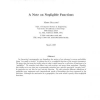Free Online Productivity Tools
i2Speak
i2Symbol
i2OCR
iTex2Img
iWeb2Print
iWeb2Shot
i2Type
iPdf2Split
iPdf2Merge
i2Bopomofo
i2Arabic
i2Style
i2Image
i2PDF
iLatex2Rtf
Sci2ools
JOC
2002
2002
A Note on Negligible Functions
In theoretical cryptography, one formalizes the notion of an adversary's success probability being "too small to matter" by asking that it be a negligible function of the security parameter. We argue that the issue that really arises is what it might mean for a collection of functions to be "negligible." We consider (and define) two such notions, and prove them equivalent. Roughly, this enables us to say that any cryptographic primitive has a specific associated "security level." In particular we say this for any one-way function. We also reconcile different definitions of negligible error arguments and computational proofs of knowledge that have appeared in the literature. Although the motivation is cryptographic, the main result is purely about negligible functions. Supported in part by NSF Grant CCR-0098123, a Packard Foundation Fellowship in Science and Engineering, and an IBM Faculty Partnership Development Award. 1
Related Content
| Added | 22 Dec 2010 |
| Updated | 22 Dec 2010 |
| Type | Journal |
| Year | 2002 |
| Where | JOC |
| Authors | Mihir Bellare |
Comments (0)

